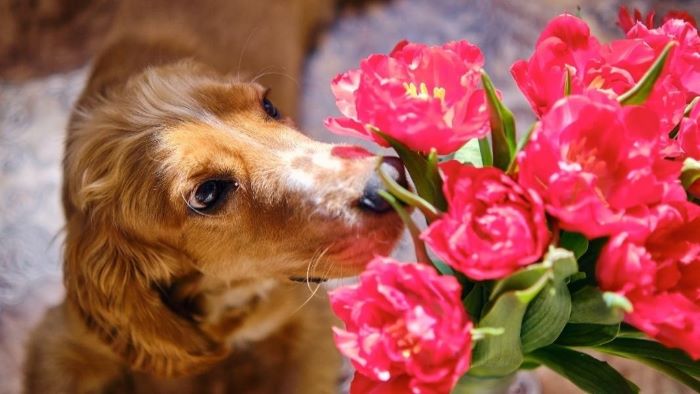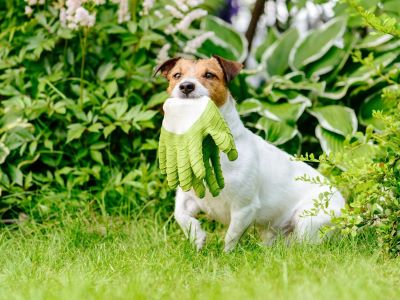In the fascinating gardening era, concerns regarding the safety of plants for our cherished pets frequently surface. Pet owners frequently wonder “Are Pansies Poisonous To Dogs?” This in-depth guide will explore the specifics to give you trustworthy information and professional insights.
It’s common knowledge among pet owners that their dog or cat will chew on anything they can get their teeth into, whether it’s a toy, a ball of yarn, or a shoe. Additionally, your pet will inevitably want to nibble on flowers and plants. Though these vivid blooms are breathtaking, some houseplants and gardens can be especially dangerous for our waggish companions.

What are Pansies?
These gorgeous, vibrant flowers are not only safe for dogs to eat, but they also seem to taste good. There is a pansy to please everyone because they come in a rainbow of colours, including blue, white, yellow, red, orange, and purple.
Members of the Violaceae family, pansies are prized for their eye-catching beauty. Garden buffs always turn to these cool-season flowers since they grow well in a variety of climes. Any outdoor area is made more appealing by their symmetrical petal arrangement and a wide choice of colour selections.

Beautiful flowers can be found on pansies, an outdoor garden plant. The edible and highly decorative petals of pansies are used in food. Pets may be drawn to the scent of pansies, which could be hazardous to them to some extent.
Are Pansies Safe?
Although they are not thought to be toxic, pansies are not very safe for pets to eat. Plants can become potentially toxic when misused or when their consumption increases.[1]

Are pansies poisonous to dogs? is a question that is frequently asked.
If you have dogs in your yard, pansies are safe to have there. You don’t need to worry if your dog chews on your pansies because this quickly spreading perennial is safe for dogs and puppies. Although it’s advisable to keep an eye on dogs that eat plants in case they swallow something toxic, pansies won’t make a dog sick or negatively affect its health.
Dr. Dorman says, “It’s important to remember that your pet cannot distinguish between safe-to-eat plants and those that are dangerous. The key to preventing poisonings in your pets is to prevent exposure.” confirms petMD
Are Pansies Pet-Friendly?

Hardy and pet-safe garden plants are pansies. Pansies have an extremely low degree of toxicity when compared to other garden plants, making them edible plants. Pets like dogs shouldn’t suffer too much from them.
That being said, you should exercise some caution because consuming pansies in excess can have negative health effects. Your pets can be drawn to the wintergreen flavour of pansies. Pets that consume larger quantities of these plants may experience dyspepsia. The absence of pansies in their usual diet can harm your pet’s health.
They may experience issues such as diarrhoea, dermatitis, vomiting, stomachaches, and skin irritation. Pets may be harmed by the bitter components (saponins) and mucilage that are abundant in pansies. The thick, sticky material that pansies create is called mucilage. While your pet is eating, intestinal parasites and amoeba species found in mucilage may make their way into their stomach.
Similar to pansies, saponins are naturally occurring plant toxins that can harm your pet’s digestive tract and result in pain, vomiting, diarrhoea, and cramps. Keeping your dogs away from pansies is the best way to keep them safe. When deciding where to plant pansies, exercise caution. The location in your garden needs to be out of your dogs’ reach.
How Dangerous Pansies Can Be?

Pansies don’t have many negative effects, although they are quite poisonous. The mildly poisonous ingredients found in pansies include mucilage, tannins, and saponins. Taking small amounts of pansies won’t ever hurt your dogs.
However, your pet’s illness could be the result of high consumption. If your pets consumed pansies, you might observe some signs in them. They may be drooling, experiencing diarrhoea, or vomiting. Additionally, you should inspect the plants to ensure that your pets have only ingested pansy bites and not those from other plants.
Even if you may have a large garden, you still need to act quickly to save your dogs from any serious harm if you discover that a sizable portion of your pansy plant is missing. To resolve this, you need to get in touch with the veterinarian right away. Pansies are classified as belonging to class two of the four toxicity classifications.
Thus, pansies have a low level of toxicity. Since pansies are not as hazardous as other plants, you can take care of your pets.
Ways To Prevent Your Dog From Eating Pansies
Dogs are infamous for enjoying everything appetizing. During the spring, it’s not uncommon to find dogs consuming pansies. Pansies have a slight toxicity to humans, but not enough to be dangerous. The taste of pansies is so similar to fresh lettuce that dogs may begin to eat them.
Natural substances found in pansies, like as saponins, can induce gastrointestinal distress when consumed. Mucilage can cause oral irritation and swelling. Additionally, pansies’ tannic acid may induce nausea, diarrhoea, and stomach discomfort. Here are some ways you can prevent this from happening:
- Place your pansies in a location that is inaccessible to your dog.
- You can place some prickly branches in the ground at regular intervals to deter your dogs from playing with pansies.
- You can use apple bitters or white vinegar spray on your pansies.
- Dust your plants with powdered mustard or red pepper flakes.
- Plant marigolds in between the pansies as well.[2]
What To Do If Your Dog Consumes Pansies?

Pets have no idea what meals are good for them and what aren’t. The responsibility for providing for the pet’s requirements and monitoring their feeding habits should fall on the owner.
You should heed the professional advice of the veterinary clinic if you know that your pet has eaten pansies. Any symptoms or problems your pet may be experiencing after consuming pansies should be reported. Verify if your pet is breathing and acting correctly. Give your local veterinarian a call as soon as you notice any unusual behavioural changes in them.
This is not something you should ever take lightly. An expert can determine if your pet needs to be sent to the hospital or treated at home. Your pet has a higher chance of recovering from pansy poisoning if you take care of them as soon as possible.
The precise plant that poisoned your pet will determine how they are treated, whether they are at home or in a vet hospital. The veterinarian will attempt to determine the impact of the plant material on your pet’s stomach and adjust the course of therapy accordingly.
FAQs
Are Pansies Poisonous To Dogs?
Pansies and dogs can live together safely most of the time, although caution should be used. Pansies don’t pose much of a threat, but you should still watch your dogs to make sure they don’t eat the blooms or leaves. Some dogs may have allergies, so pay attention to how your dog responds as you introduce new plants to the garden.
Can all pansy varieties be harmful to dogs?
While most pansies have mild toxicity, certain varieties are less harmful. Opting for less toxic varieties can reduce the risk to your canine companion.
What should I do if my dog shows signs of pansy poisoning?
Seek immediate veterinary attention. Timely intervention is crucial in minimizing the impact of toxicity.
Are there natural deterrents to keep dogs away from pansies?
Planting dog-repelling herbs like lavender or using safe deterrent sprays can help keep your furry friend away from potentially harmful flowers.
Are there alternative flowers that are safer for dogs?
Yes, several dog-friendly flowers, such as marigolds and petunias, can add beauty to your garden without posing significant risks.
Conclusion
Plants like pansies might be somewhat harmful to your pets, including cats and dogs. Their appealing texture and flavour may draw in animals. Pets of many sorts may safely be around pansies. Some animals, such as rodents, squirrels, and rabbits, adore eating pansies. On the other hand, it might not be as safe for animals like dogs and cats. This article answers the question “Are Pansies Poisonous To Dogs”.
In pansies, the main poisonous ingredients are mucilage and saponins. While small amounts of pansies might not be harmful to your dogs, frequent ingestion might lead to health problems for them. Certain symptoms, like upset stomach, drooling, vomiting, and mouth irritation, can affect both dogs and cats.
If you see that your pet is agitated or acting out, call the closest veterinarian right away. For their safety, however, it is best to keep your pet away from these plants.
References:



